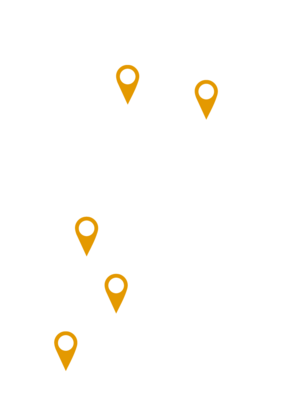Making purchases via online trading platforms has permanently changed our habits. Never before has it been so convenient to order and pay for products from different suppliers via a single access point. In the future, it will be just as easy to use train, bus, car sharing and other public transportation services via a mobility platform developed by the IT company highQ Computerlösungen. Among the pioneers of this new, digitally networked mobility is the city of Osnabrück in Lower Saxony, Germany.
“If you want to get people out of their cars, you have to make them a really attractive offer”, observed Thomas Hornig, Managing Director of highQ. The mobility specialists at the 60-strong Freiburg-based IT company have been thinking for many years about how a change towards more environmentally friendly forms of transport can be achieved. Their pivotal approach is a digital mobility platform on which all of a city’s transport services are combined under one (software) roof. Following a one-time registration with the platform (single sign-on), transportation users can then book any intermodal travel chain directly via an associated smartphone app.
This concept, also called “seamless mobility” by transport experts, is intended to compensate for the comfort advantage of the private car. “This is a great opportunity for transport companies to reposition themselves as comprehensive mobility service providers”, Thomas Hornig pointed out. highQ develops the necessary software modules for this type of networked transport service, for example to enable cross-supplier billing for the various transport services provided.
Osnabrück leads the way
Among the pioneers in this field is Stadtwerke Osnabrück (SWO), which has been implementing a comprehensive digitisation programme for urban mobility services for three years now. Based on the highQ platform concept, the system has so far integrated municipal bus services, local car sharing and municipal parking garages, with lockable bicycle shelters set to follow soon. “Thanks to the modular system structure, we can add further offers at any time, such as rental pedelecs and e-cargobikes”, explained Maik Blome, marketing and sales manager for SWO’s mobility services. “Following a one-time registration, our customers then have access to all transportation offerings.”
A service that appears so simple for the end user required a considerable amount of effort before it could be achieved. In particular, heterogeneous IT inventory systems needed to be linked via adapted interfaces so that the flow of data between the various Osnabrück mobility providers could run smoothly. The implementation of the entire system was carried out under the leadership of highQ as general contractor. According to Maik Blome, this proved to be a good decision: “We always had one central contact person for any questions or problems.”
One swipe and off you go
The Osnabrück mobility platform is scheduled to go into full operation in the course of 2020. As well as being able to use all modes of transport across all providers, this includes a new type of ticket system. The check in/check out ticketing system makes bus travel much more convenient for occasional passengers. When boarding the bus, a swipe of the smartphone is all that is required – and that’s it. The system itself determines where you change and get off and automatically calculates the price for the distance covered. A further advantage for passengers is “best price” invoicing. All individual journeys completed within a certain period of time are retrospectively charged to a day or week ticket – meaning that customers always receive the cheapest ticket. “With this system, we in Osnabrück are a nationwide pioneer”, Maik Blome explained.
With its mobility platform, the city in Lower Saxony has also prepared the way for the digital future of local transportation. Maik Blome offered a foretaste of how things will be by 2030: “Public transport in Osnabrück will be networked, digital, electric and autonomous, providing passengers with a seamless, multimodal mobility chain from door to door.” In the future, this will include on-demand, non-timetabled services for the last mile. Blome summarised the city’s ambitious goal: “We aim to make public mobility in Osnabrück so easy and convenient that you will never miss your car again.”
Rewarding sensible mobility behaviour
Experience shows that it is difficult to persuade die-hard drivers to switch to public transport, even with the best offer. For this reason, highQ has developed an even more far-reaching strategy that includes private cars in the mobility mix in addition to the means of transport provided by the environmental alliance. The concept is to use highQ’s mytraQ app to provide commuters with individual travel recommendations based on current traffic data and the behaviour of other mytraQ users. If traffic is congested somewhere, the app suggests less congested alternative routes or recommends switching to public transport, car sharing or a combination of different modes of transport.
Anyone who follows the app’s advice is rewarded twice over. For a start, they reach their destination quickly and without stress. In addition, they are credited with “time mile”, which can later be exchanged for free journeys, free parking periods or shopping discounts. Research results confirm that this type of bonus system works. Provided that a conurbation has sufficient public transport, monetary or non-cash incentives can be used to steer individual mobility behaviour in the desired direction in terms of choice of transport mode, route and time of day. The concept has already been thoroughly tested in Stuttgart under the project name “moveBW” and will soon be put into live operation.
Apart from the road users themselves, the cities benefit too by evening out traffic flows in terms of time and space and distributing them more evenly over the existing infrastructure. However, commercial enterprises can also use “time miles” to motivate their employees to use bicycles more frequently or to form car pools, thereby improving the efficiency of parking space management and their environmental balance. As highQ Managing Director Thomas Hornig concluded: “In any case, it makes more sense to invest a comparatively small amount in intelligent mobility than to invest huge sums in additional roads or parking spaces.”


![[Translate to English:] [Translate to English:]](/fileadmin/_processed_/9/b/csm_Stadt_der_Zukunft_FAZ_2022_dc46e57b0f.jpg)





